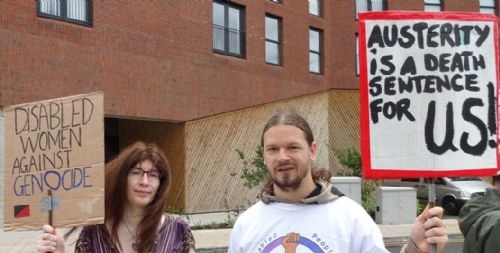Personal Independence Payment (PIP) as a form of Necropolitics.
Written by Rebecca Porter

In this first of a series of blogs that will be written by our PhD students, Rebecca Porter, who has just begun her studies tells us about her research project and her motivation for undertaking this work. Rebecca is based at the School of Sociology & Social Policy. She is supervised by Dr Tom Campbell & Dr Alison Sheldon.

Photo of Rebecca Porter
For every successive government, the question of the disability category, as understood by the welfare state, has been a significant one. However, arguably, none have been quite as contested as the welfare reform act 2012. Alongside other benefits deemed to be inhumane, like Universal Credit as a whole, the ‘bedroom tax’ or the work capability assessment, Personal Independence Payment (PIP) has had a chorus of voices protesting against it.
My own interest in Personal Independence Payment first came as a claimant. I was very new to identifying as a disabled person, having just started my undergraduate dissertation and I decided to seek financial help once I recognised it was costing me more than my peers to live. Further, I had just left a job due to it becoming unmanageable alongside my studies. The assessor did not see me as human. I was grilled for around an hour. I had to explain my impairments in detail, recount events that I didn’t really want to, but facing pressure, had to. All to try to ‘perform’ my helplessness as a disabled person. At the same time, I was taking a module on postcolonial thought. Necropolitics, with grounding in Foucault and Bauman, is the idea that states can expose their citizens to death. In doing so, some marginalised groups (Mbembe uses racial identity) are given ‘living dead’ status, where they are not truly living, and instead, merely exist between true life and absolute, physical, death. States have the right, through sovereignty, to impose a social death upon these groups, as a form of political violence.
Once I started my MA Disability Studies, I began to explore disability theory more and more. What Personal Independence Payment was even about, what had come before it, and why the government created something so demeaning? I suppose it was at that point where once again the sociologist in me could not just leave something alone. Therefore, I decided I would use my PhD as a form of resistance against PIP: a way of channelling my anger into something productive. I do not think any academic just decides to start working on something, without taking it personally!
My PhD will argue that Personal Independence Payment is a form of necropolitics (at first, that seems very heavy, I know). PIP is a tool used by the government to choose who lives and dies, with the majority of disabled people not ‘living’ due to social death, Personal Independence Payment, as the government’s tool to shift people from the disability category, disables the claimant even further. Even if successful, claimants undoubtedly suffer in their experiences, the feeling of forever being watched by a panopticon-like Department for Work and Pensions, the feeling of dread when a brown envelope drops through the letter box, and the scathing harm of being labelled as a ‘scrounger’ or ‘cheat' - even going as far as to be seen as not ‘really’ being disabled. Political violence, although hiding in a cloak of ‘necessary’ austerity measures, is alive and well in the U.K.
I feel it speaks volumes when, in 2017, the United Nations found that changes to the welfare system gravely and systematically infringe on disabled people’s human rights. If that’s finding doesn't point to a necropolitics, I don’t know what does!
Author
Rebecca Porter
Doctoral Research Student
